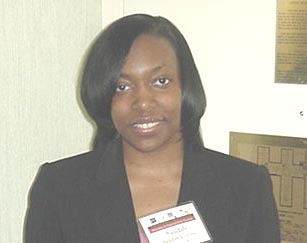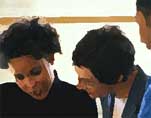Interview with Saudah CollinsPresidential Award for Elementary Science Teaching, 2004 |
 |
Saudah Collins is currently a doctoral student at the University of South Carolina, where she teaches science methods for the Early Childhood Master of Arts in Teaching program. She also serves as a teacher leader for the federal Teacher Quality Pathways project. This National Board-certified teacher began providing professional development as a way to share strategies for developing quality experiences for elementary school children. She has provided science professional development for individual schools and districts, and at local, state, and national conferences.
How did you get started in providing professional development?
During my senior year as an undergraduate I began answering calls for conference proposals. While facilitating conference sessions over the next several years, science leaders who saw me present asked me to present to teachers in their areas. The first presentation I made as a professional teacher was at the Palmetto State Teachers Association Fall Conference. I addressed strategies that work for students, not necessarily in the area of science, however. I focused on such topics as classroom management and parent communication. Eventually, I presented on science inquiry, concept development, and management issues related to science learning experiences.
When you were teaching full time at Horrell Hill School, how did you juggle your teaching responsibilities with providing professional development?
It is important to keep good records and copies of the materials you use in your presentations. Keep samples of student work as well. Having a bank of resources ready to go saves time. Think ahead—have everything ready. Another factor that facilitates the balancing of the two roles is a supportive administration. I have had to obtain professional leave time to present at the national, state, or local level, but I have had to use personal leave time if I was contracted to present. It is also important to determine the number of professional development requests you will be able to accept so that your time away from school does not adversely impact your students.
Horrell Hill is a professional development school in partnership with the University of South Carolina. The school’s mission is to be a leader in best practice in the field of education. Teachers who present at and attend conferences are expected to share what they learned there with other teachers locally.
What advice would you give to a teacher who wants to get involved in providing professional development?
You need to have an inclination for this sort of work. Some teachers are excellent in the classroom, but do not feel the inclination to do professional development. You also need to find an area of instruction about which you are knowledgeable and for which you have a passion. Keep abreast of the field. Teachers want to learn about strategies and learning experiences that they have not already attempted or been successful doing, but that you have. Do not try to present on a topic or strategy that you have not successfully utilized with your students. Your presentation has to be “student tested-student approved.” Bring samples of student work. Refer to student successes and challenges. Finally, be sure to request feedback from the participants of the session in order to refine your presentation for future professional development sessions.
When a teacher starts conducting professional development workshops, how can he or she establish a comfort level or trust with the participating teachers?
First, captivate the participants’ attention with a strong, intriguing title, but one that also really relates to your topic. If participants have a choice as to what sessions to attend, your session title should grab their attention and set the tone. The title should be accompanied by a clear and concise session description. Second, don’t be too rigid in your presentation. Present yourself as a peer. Remain relaxed and use humor; give snapshots of your classroom; cause the participants to say to themselves, “I have been in that situation.” Third, make your presentation interactive. Refrain from lecturing.
How can you ensure that what teachers learn in professional development is implemented over time in the classroom?
Ideally, you would make follow-up visits to classrooms and even assist in implementation. However, you might see your participants at other meetings or conferences where you can ask them about how they are using what they learned in the previous workshop. Also, you can provide the participants with your contact information. I have also found that if you interactively utilize the materials needed for the learning experience during the presentation and provide the participants with something tangible to use with their students, they are more inclined to use what they learned.
As a provider of professional development, what sort of feedback do you like to get from your participants?
I look first to the reactions of the participants during the session(s). I observe reactions expressed through eye contact and gestures. This helps me modify the session as I proceed. This is not different from determining whether my classroom students are engaged, confused, or disinterested. I also ask participants what they think about what they are hearing or doing in the session, using questions such as, “What do you think will work for your students?” or “How will your students react?” I also use the traditional, anonymous, reflective writing prompts for feedback, which include questions such as, “What was meaningful for you?” “How will you use what you have learned?” “What part of the presentation do you think was a waste of time?”
How do you think science professional development can get “equal time” with reading?
District and school administrators may develop more of an appreciation of the importance of quality science professional development if science-test scores affect their district or school ratings. A better motivation, however, would be for families to learn of the students’ need for strong science skills that may be utilized presently and later in life. While stressing the importance of having a science literate child, families would also be interested in learning more about job opportunities in science-related fields. Families will then begin to demand quality science experiences for their students.
Teachers also need to be reflective practitioners. If their science instruction is textbook-driven or practically nonexistent, then quality professional development will help them to develop learning experiences that will increase student interest and achievement. When teachers see how motivated their students become when they are engaged in quality science experiences, the teachers will become encouraged to provide the science and seek more science professional development.
How do you think your experiences in providing professional development contribute to the advancement of science reform?
It only happens if science education at any level, including professional development, begins with students. If we step away from the classroom for professional development work, higher education positions, administrative positions, or for any other professional reasons, we have to reconnect regularly with students and the challenges of teaching in today’s schools. For teachers to reform the way science experiences are developed and implemented, they will want to experience professional development with a facilitator that has had recent, relevant classroom experience.
If you have questions you would like to ask Saudah Collins about her experiences in providing professional development, contact her at collinsteach@bellsouth.net

